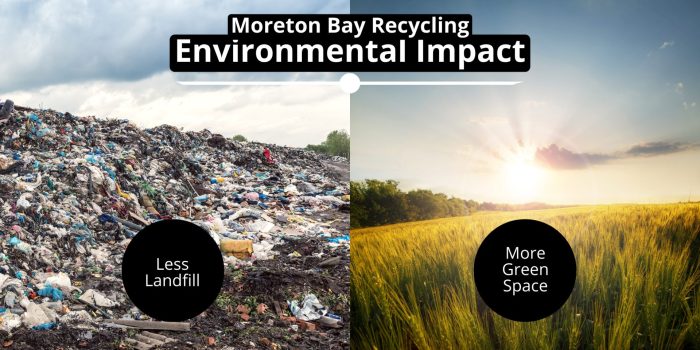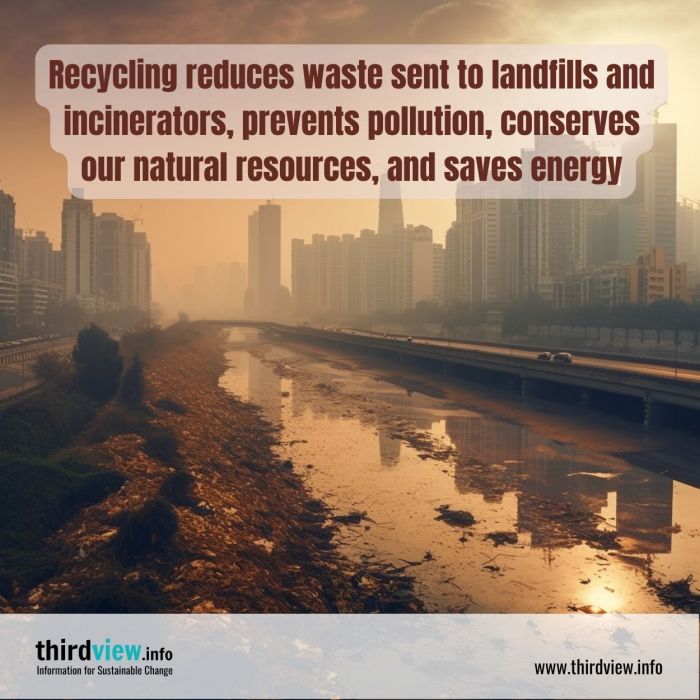Exploring 9 Ways to Reduce Your Impact on the Environment Through Recycling brings to light practical strategies and innovative solutions to minimize your carbon footprint and promote sustainability. This comprehensive guide dives into the importance of recycling, provides household tips, and delves into creative recycling practices that can make a significant difference.
Importance of Recycling

Recycling plays a crucial role in reducing our environmental impact by conserving resources, reducing waste, and saving energy.
Materials that can be Recycled
- Glass: Recycling one glass bottle saves enough energy to light a 100-watt light bulb for four hours.
- Paper: Recycling one ton of paper saves 17 trees, 7,000 gallons of water, and 463 gallons of oil.
- Plastic: Recycling plastic helps reduce the amount of plastic waste that ends up in landfills and oceans.
- Metal: Recycling aluminum cans saves 95% of the energy it would take to make new cans from raw materials.
Statistics on Recycling
According to the Environmental Protection Agency (EPA), recycling and composting prevented 186 million metric tons of carbon dioxide emissions in the United States in 2018. This is equivalent to taking 39 million cars off the road for a year.
Household Recycling Tips

Recycling at home is a simple yet impactful way to reduce your environmental footprint. By separating recyclables from regular waste, you can help conserve resources and protect the planet for future generations. Here are some practical tips for recycling in your household:
Setting Up a Recycling System
Creating a recycling system in your home is easy and can make a big difference. Follow these steps to get started:
- Designate a recycling bin: Choose a separate bin or container specifically for recyclables. Make sure it’s easily accessible and visible to everyone in the household.
- Know what to recycle: Familiarize yourself with the types of materials that can be recycled in your area. Common items include paper, cardboard, plastic bottles, glass containers, and aluminum cans.
- Label the bins: Clearly label each bin with the type of materials that should be placed inside. This will help avoid confusion and ensure that items are sorted correctly.
- Set up a collection schedule: Establish a routine for emptying the recycling bins and taking them to the designated collection point. This will help maintain a clean and organized recycling area.
- Educate your family: Make sure everyone in the household understands the importance of recycling and knows how to properly sort recyclables. Encourage them to participate in the process.
Innovative Recycling Practices

When it comes to reducing our impact on the environment, innovative recycling practices play a crucial role in promoting sustainability. By exploring creative ways to repurpose items instead of discarding them, we can significantly minimize waste and conserve valuable resources.
One such concept that has gained popularity in recent years is upcycling. Unlike traditional recycling, which involves breaking down materials to create new products, upcycling focuses on transforming old or used items into something of higher quality or value. This process not only helps reduce waste but also promotes creativity and innovation in finding new uses for existing materials.
Businesses Implementing Sustainable Recycling Practices
- Patagonia: The outdoor clothing company has implemented a Worn Wear program that encourages customers to repair and recycle their old garments, reducing the amount of clothing waste sent to landfills.
- TerraCycle: This innovative company specializes in recycling hard-to-recycle materials, such as cigarette butts and coffee capsules, by partnering with major brands to collect and repurpose these items into new products.
- IKEA: The furniture retailer has introduced a circular business model that focuses on repairing and refurbishing furniture to extend its lifespan, as well as using sustainable materials in their products to promote recycling and reduce waste.
End of Discussion

In conclusion, embracing these 9 Ways to Reduce Your Impact on the Environment Through Recycling can lead to a greener and more sustainable future for generations to come. By making simple yet impactful changes in our daily habits, we can collectively make a positive difference in protecting our planet.